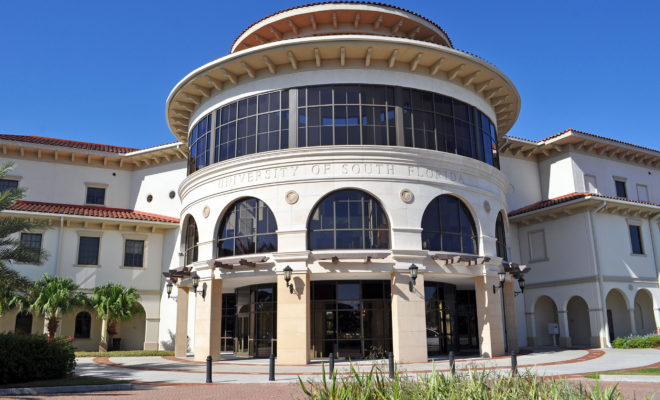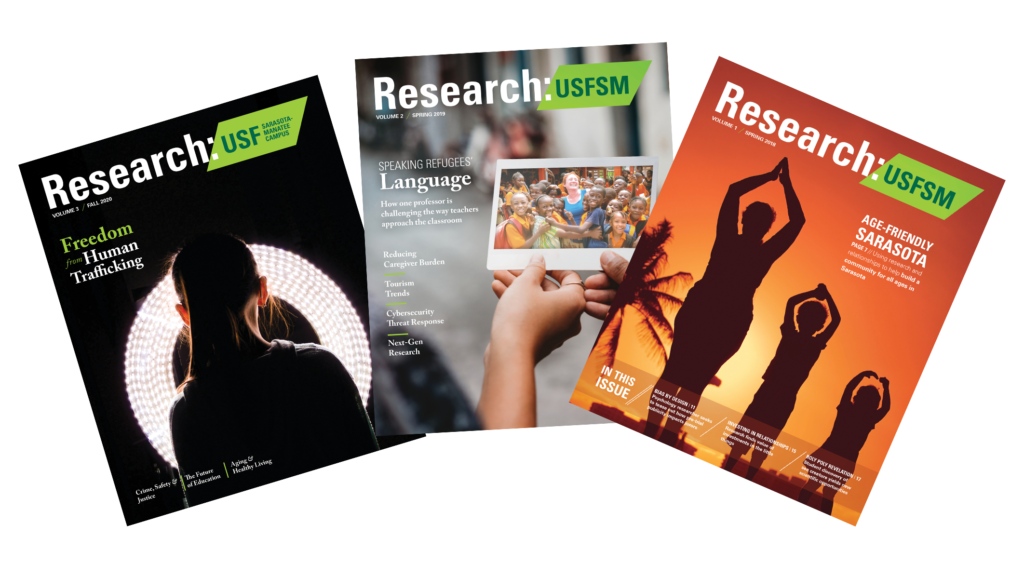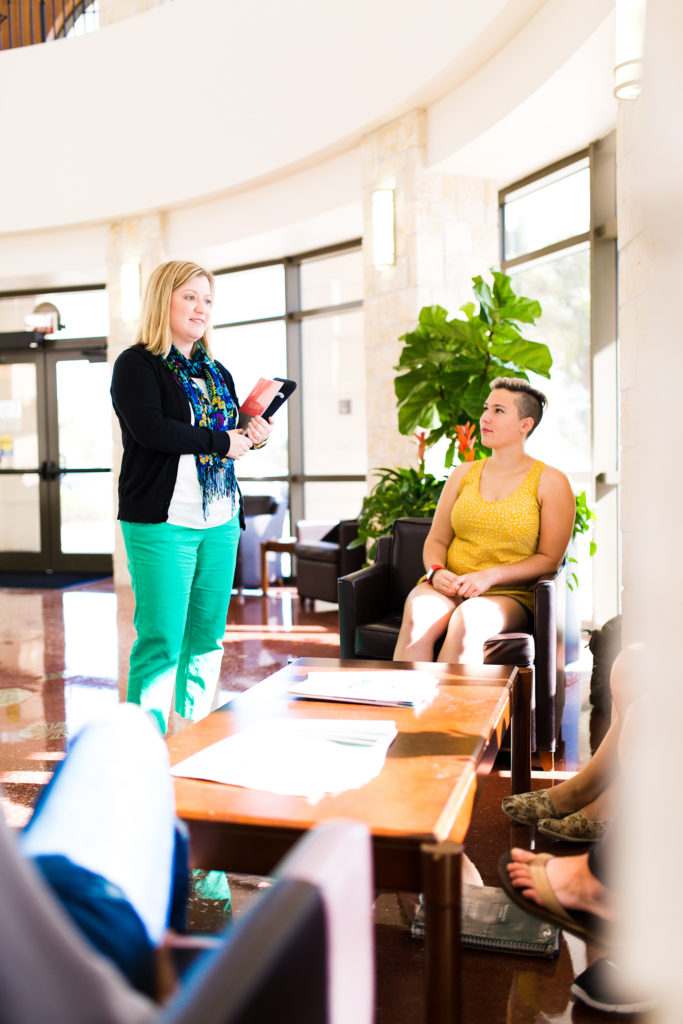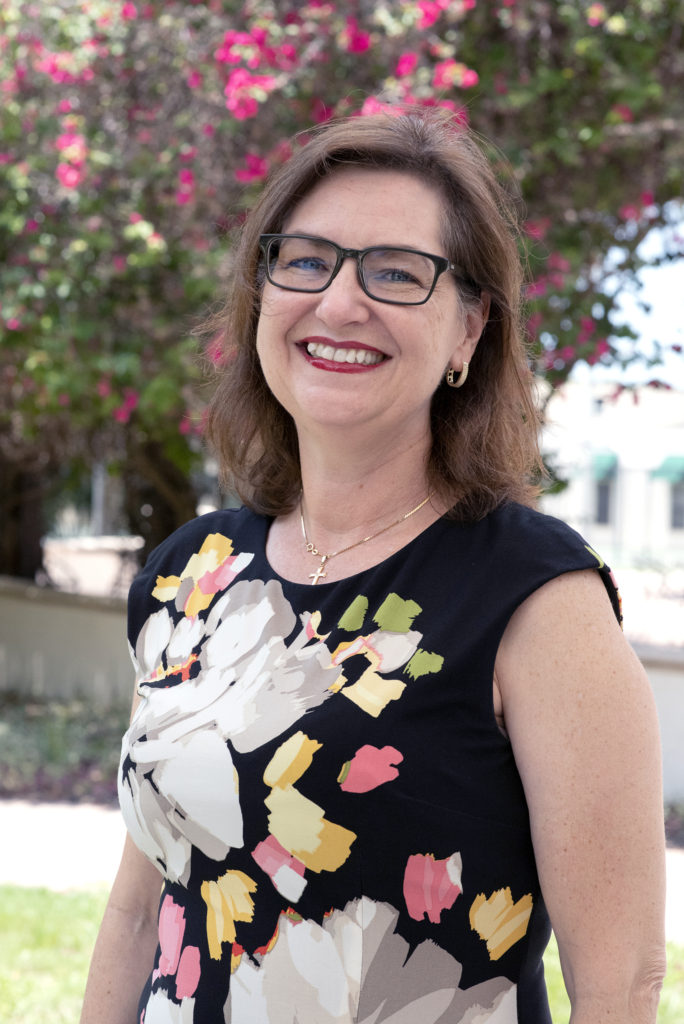
Education
Education Matters: The Importance of Research at USF Sarasota-Manatee
By Ryan G. Van Cleave
Before becoming regional chancellor in 2018, Dr. Karen Holbrook joined the USF Sarasota-Manatee campus leadership team as executive vice president in 2017 with one of her top priorities being to build upon on the quality and quantity of research being conducted.
“A university is not simply about passing on knowledge. It also has a responsibility to create and discover fresh, vibrant knowledge,” says Dr. Holbrook. “Faculty have their own disciplines and we want to provide opportunities for discovery. We also want to provide opportunities for students to engage in the research process and become connected to the real world.”
Today, the USF Sarasota-Manatee campus is doing exactly that, and sharing exciting discoveries and advances in a campus research magazine. The third edition, published in October, highlights outstanding research being performed by faculty in STEM and non-STEM disciplines along with many of the community connections that have been made.

The range of activities and research accomplishments showcased in the publications during the past three years is impressive. The cover story in the inaugural edition in 2018 featured the work of Dr. Kathy Black, an internationally acclaimed USF professor of aging studies and social work. Black’s efforts helped Sarasota become the first community in Florida to be designated an “Age Friendly Community” by the World Health Organization. Last year, Professor Jody McBrien, a 2019 Fulbright Award recipient from the College of Arts and Sciences, was highlighted for her research into policy and education practices for refugees, along with Dr. Giti Javidi, who conducts research on cybersecurity and is building a new academic program in this area on the Sarasota-Manatee campus.
One of the most fascinating projects is the current issue’s cover story—Dr. Jessica Grosholz’s research on freedom from human trafficking. Dr. Grosholz leads a team of researchers that includes colleagues Drs. Sandra Stone and Fawn Ngo who are examining the actions and services of Sarasota-based Selah Freedom, a nationwide anti-sex trafficking organization. Why is this topic so relevant? Because Florida annually reports one of the highest incidences of sex trafficking crimes in the US.

To date, Dr. Grosholz and her colleagues have spent more than 100 hours with the Selah Freedom staff during training and therapy sessions. The findings of their action research have resulted in one book chapter, several technical reports, and numerous conference presentations. Their funding runs through October 2022, so they’ll surely generate a lot more data to compile and share.
Dr. Grosholz notes that her teaching and research intersect on a daily basis. “They are both guided by connection—a connection to the research, a connection with others, and a connection with the larger community,” she says. “As my students make these connections in and out of the classroom and as I make these connections through my research, I see growth, I see change, and I see transformation among everyone involved. The students who enter my classroom—in person or virtual—are not the same individuals who leave my classroom at the end of each semester. They are more mature, they are more open-minded and, simply put, they are more receptive of issues they once thought were exceptionally far removed from their own personal experiences.”
As a co-investigator on Selah Freedom’s grant from the US Department of Justice’s Office for Victims of Crime (OVC), Dr. Grosholz feels her work as an applied criminologist with expertise in program evaluation is validated. “Being the evaluation arm of Selah Freedom’s OVC grant has also allowed me to develop additional partnerships with community organizations that may be fruitful for future research and evaluation efforts.” Perhaps most important, her work offers crucial feedback about Selah Freedom’s training programs for awareness, prevention, residential, and outreach services. It allows Selah Freedom a new way to see the impact of their work as well as discover where room for improvement exists.

Sandra Justice, USF Associate Director of Research and Innovation, is excited by the synergy of research activity at the Sarasota-Manatee campus.
“During the past few years there has been a growing enthusiasm among our faculty to work collaboratively on important research projects,” says Justice. “We are thrilled to share their accomplishments in our annual research magazine that also showcases the important collaborations created through our community engagement and business partnerships. Research paves the way to discovery and provides students unique experiential learning opportunities, strengthening creative and critical thinking. Today’s incoming freshmen are tomorrow’s leading artisans, educators, writers, inventors and trail blazers.”
Justice adds that while the USF Sarasota-Manatee campus has an emerging research environment, physical space is still desperately needed to advance high-impact, interdisciplinary research. “There are plans in place for an Integrated Science and Technology Complex for the campus,” she says. “Providing a research environment and growing the capacity for faculty innovation requires an investment of space, equipment, and people resources. When this vision becomes a reality, that will be the game changer.”
Justice believes that the investment in a research facility is a worthwhile investment and notes, “Research is the pursuit of human truth, creative arts, technological advances, and so much more. More important, research universities are where students mature into the scientists and innovators that can change the world.” Dr. Grosholz witnesses that kind of thing happen every semester.
Dr. Holbrook points out that because the USF Sarasota-Manatee campus is part of a major preeminent global research university, “research is a crucial part of our mission. Research is exciting and transforming, really. I am always doing research on something. Right now, I am researching cybersecurity and emerging technologies as we aim to build our academic programs in this area.”
FOR MORE INFORMATION about the University of South Florida Sarasota-Manatee, please visit www.sarasotamanatee.usf.edu or call 941.359.4200.
To view the current issue of their research magazine, please visit researchmagazine.sarasotamanatee.usf.edu.



You must be logged in to post a comment Login